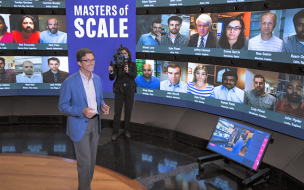The new digital programs are the latest push by innovative educational start-ups into business schools’ territory, with Coursera’s new roster of courses featuring industry projects that are similar to internships.
Learning tech companies have been developing more vocational courses in response to both student and recruiter demand, with the focus shifting to careers, and the idea that online courses can represent a genuine alternative to traditional degrees.
Coursera rival edX announced plans to launch a series of short paid-for executive courses last year that have been developed with leading universities including MIT Sloan, the business school.
Coursera’s new spread of online programs, called Specializations, have been designed with companies including Snapdeal, the Indian e-commerce group, and Shazam, the music discovery app that wasrecently valued at more than $1 billion.
“Companies want to play a bigger role in fostering the talent they need to hire,” said Rick Levin, chief executive of Coursera and former president of Yale University.
Pennsylvania‘s Wharton, the world’s third highest-ranking business school, has developed a Specialization called Business Foundations which covers the accounting, finance and marketing functions, as well as operations management.
Participants can complete an industry project with Snapdeal or Shazam. The cost of the four courses and the business project with a verified Coursera certificate is $595.
Wharton will invite the top-50 course takers to apply to one of the school’s graduate business programs each year, waive their application fees, and offer up to five participants $20,000 scholarships to study its MBA program, if admitted.
Geoff Garrett, dean of Wharton School, said that the industry projects will allow participants a glimpse into the real challenges that businesses are facing.
Speaking exclusively to BusinessBecause, he said that technology enables Wharton to keep pushing the boundaries of what pure online education can be. “We will continue to use technology to improve our on-campus education,” he said.
Many top business schools have utilized Moocs, or massive open online courses, to market their expensive postgraduate degree programs, and Geoff sees fee-paying online programs as a similar tool.
“This will also give us the ability to identify talent we might not otherwise know about, and who might not otherwise know about us,” he said. “We want the very best students – no matter where they come from.”
Coursera has enrolled hundreds of thousands of people globally since an initial launch of the Specializations in January 2014. It offers Specializations from 19 university partners, in fields like data science, digital marketing and global affairs.
The company's industry projects, called Capstone Projects, are the latest evolution of Moocs, as the courses become more rounded qualifications that will be more valued by employers.
“Learners want ways to demonstrate the knowledge they gain from universities in a way that is applicable for their careers,” said Rick.
Approximately half of Coursera’s learners are trying to boost their careers, he said. “[They] need a way to gain essential new skills without dropping everything to go back to school full-time,” he added.
As well as Snapdeal and Shazam, photo sharing site Instagram, which was bought by Facebook for $1 billion in 2012, has developed a new digital program focused on interaction design.
The Coursera course is part of a tie-up with the University of California San Diego.
Mike Krieger, Instagram’s co-founder, said: “As our devices become increasingly powerful, it’s essential that we create a generation of designers and builders who can help people around the world harness that power.”
He added that a similar course he took while at university has had a lasting impact on his career, and on the design of Instagram, which has grown to have 300 million monthly active users, more than Twitter.
Coursera’s third new digital offering is focused on entrepreneurship. It has been developed by a partnership with 500 Startups, a Silicon Valley-based accelerator, and the University of Maryland.
Its takers will get to create a business plan and pitch deck for a new business venture. 500 Startups will join an interactive pitch session with the top performers.
This is the second collaboration between Coursera and the University of Maryland, after the pair launched a mobile cloud computing course with internet search giant Google last year.
Google has since committed to reviewing the top Android apps created in a Capstone Project, and will issue Nexus tablets to the winners.
The best mobile apps developed may be considered to be featured in the Google Play store, Coursera said.
Yet online learning has been labelled a threat by some figures in the business school community.
In November, two leading US business professors wrote in the Financial Times that the disruptive technology used in Mooc courses poses a “real threat” to business schools, and could eventually “replace a large number of classroom instructors”.
Nonetheless, in a sign of things to come in online education, Coursera CEO Rick said: “This isn’t the only way we’ll work with companies in the future.”
RECAPTHA :
1e
1f
65
a3








